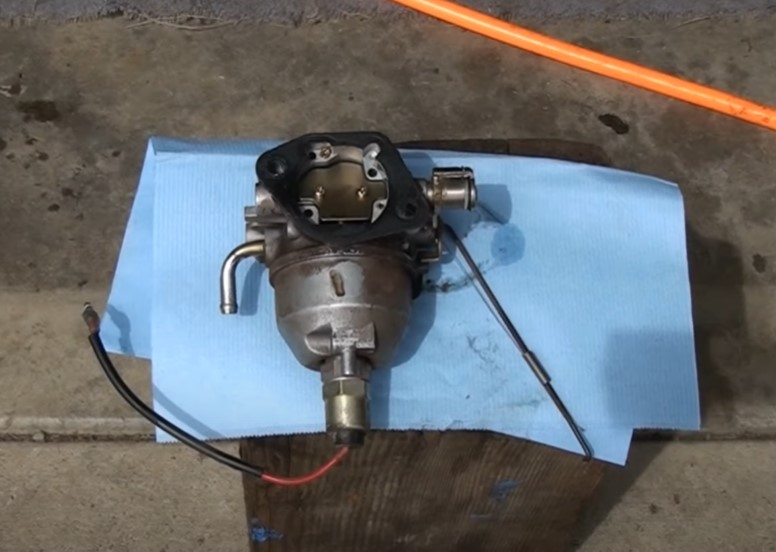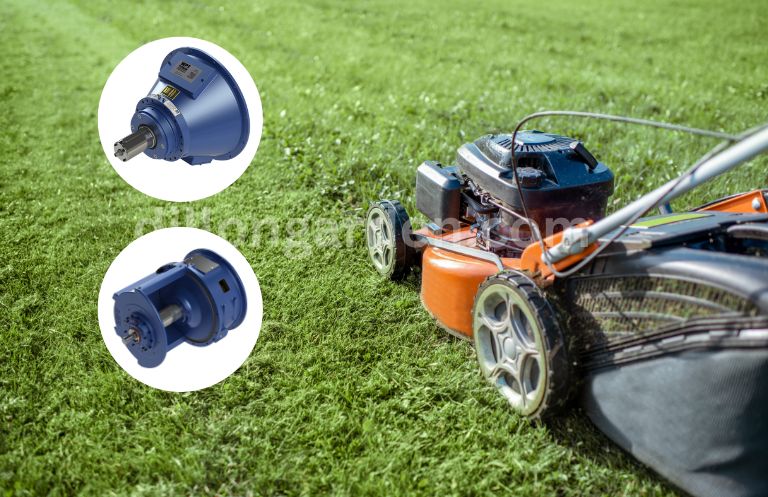Top 5 Kohler Engine Starving For Fuel Problems Troubleshooting
Fuel starvation in a Kohler lawn mower engine occurs when the fuel level is low, the fuel pump malfunctions, or the fuel filter or line is clogged or damaged. Moreover, a problem in fuel tank ventilation and a defective carburetor can also be responsible for the starvation.
With some technical skill and appropriate tools, you can fix Kohler Engine Starving For Fuel Problems issue. The common fixes are:
- Ensuring the fuel pump is submerged in fuel.
- Replacing the defective fuel pump.
- Removing carbon buildup from the fuel filter and line.
- Unclogging the fuel cap vent, and
- Cleaning or rebuilding the carburetor.
In this article, we will go through in-depth fixes for each reason and mention the symptoms of the problem and safety tips during fixing.

What Causes The Kohler Engine To Starve For Fuel?
Here is the in-depth process for fixing the fuel starvation issue in Kohler lawn mower engines.
1. Low fuel level
Low fuel level is the most common reason for the starvation. The engine’s pump is submerged in fuel. When the fuel level becomes low, the pump struggles to pull fuel from the tank’s bottom and starves. Also, the problem can happen due to a faulty fuel filter and pump.
Fuel insufficiency is bad for the engine in many ways. It can even create air bubbles that prevent fuel flow and cause engine starvation.
How to fix:
- If the fuel level seems insufficient, add more fuel to the tank. The level should be at least half of the tank so the fuel pump gets submerged.
- Check the fuel filter to see whether it is clogged. Disconnect and blow through it to see if air passes. If not, you need to replace it.
- Disconnect and Check the fuel pump and see if it works. If it does not deliver fuel, the pump is defective and needs a replacement.
2. Faulty fuel pump

The fuel pump is the key component to deliver fuel to the engine. If it becomes defective somehow, it can lose its fuel-delivering capability. It is a common reason that makes the engine starve for fuel. The fuel pump of the Kohler engine can be defective due to running empty, wear and tear, and clogging.
How to fix:
- Use a vacuum gauge to measure the fuel pressure coming from the pump. First, test the pressure with water flow and notice if the pressure is satisfactory. Note the reading. Now, try with fuel and follow the same procedure.
- If the fuel pump pressure is very low, the engine can continue to starve for fuel. In that case, replace the faulty pump with a new one.
3. Clogged/damaged fuel filter and fuel line

As time passes, the chance of the fuel filter getting clogged enhances. Dirt, particles, and carbon buildup gradually clog the fuel filter and reduce the fuel supply. As a result, the engine can starve for fuel.
Similarly, the fuel line can be clogged for the same reasons. A blocked line also prevents fuel from reaching the carburetor, another cause of fuel starving.
How to fix:
- Remove the fuel pump fuse and disconnect the battery terminals to avoid fire hazards and accidental engine start. Now remove both the fuel filter and fuel line for unclogging them.
- Wipe out debris using a brush for the basic cleaning. However, use a specialized fuel cleaning solution for a thorough cleaning. After completing the cleaning process, reinstall everything.
- If the fuel filter or line seems damaged, replacement is suggested.
4. Fuel tank vent clogging

When the ventilation system is clogged, it can create a vacuum inside the fuel tank. Such vacuum build-up is a major reason for the engine’s fuel starving. Moreover, lack of ventilation in the fuel tank causes another issue called the “fuel tank collapse.” If it occurs, filling the tank with fuel becomes difficult or impossible.
How to fix:
- First, confirm that the vent of the fuel cap is truly clogged. If a vapor lock occurs and the engine starves for fuel, simply loosen the cap. If this technique works, it indicates the cap’s vent is blocked.
- Inspect the fuel cap’s vent carefully and identify the vent. Use a pin or needle to poke the vent and unclog it.
- If the fuel cap is damaged or deformed, you must replace it with a new one.
5. Defective carburetor

The carburetor is one of the most important components in the engine. It blends both fuel and air to maximize the power with minimum fuel consumption. So, when the carburetor fails, it directly impacts the engine’s fuel efficiency. A defective carburetor can cause improper air/fuel mixture and make the engine starve for fuel.
How to fix:
- Remove the carburetor from the engine and disassemble it. Clean the carburetor and its parts with the carburetor cleaner, reassemble all parts, and reinstall it to the engine.
- If any part of the carburetor is damaged, you will need to rebuild it. Collect the damaged components, attach them in the appropriate places in the carburetor, and reassemble it. After the rebuild, reinstall it to the engine.
- If the carburetor seems very old, which will require more rework, it is recommended to purchase a new one.
4 Symptoms Of The Engine Having Fuel Starvation
Fuel starvation simply means the lack of required fuel supply from the engine’s fuel system. Here are some symptoms indicating the Kohler engine has the issue.
Engine misfiring
Engine misfiring is a primary symptom of fuel starvation. It mostly happens due to a weak or faulty fuel pump. A defective fuel pump fails to deliver sufficient fuel pressure. It can cause a lean air/fuel mixture and incomplete combustion, which is known as a misfire.
Loss of power
Lack of power is another sign the engine is starving for sufficient fuel. It usually occurs because of fuel entry limitation into the cylinder. Clogging in the fuel filter and line are two common reasons for engine power loss. Moreover, a weak fuel pump can be responsible for the issue.
Frequent engine stalling
If the engine stalls repeatedly, it is a warning sign too. Two of the common reasons for the stalling are a clogged carburetor and a blocked fuel cap vent. They can limit the required fuel supply for the engine’s smooth running. Such fuel supply restrictions can force the engine to stall frequently.
Engine overheating
Fuel starvation is also relevant to the engine overheating. When the engine gets no sufficient fuel, it can be overheated. Consistent overheating can cause several engine issues, including stalling. There is even a risk of engine failure.
Kohler Engine Fuel System Maintenance Frequency
Kohler mentions precise fuel system maintenance frequency in the user manuals. The table represents the ideal frequency to check, clean, and replace components in the engine’s fuel system.
| Maintenance/Replacement | Frequency |
|---|---|
| Changing oil | Every 100 hours |
| Checking fuel filter | Every 300 hours |
| Cleaning or replacing the fuel filter | Every 300 hours |
| Checking fuel lines | Every 500 hours |
| Draining regulator of accumulated fuel deposits | Every 500 hours |
| Disassembling, cleaning, and resetting the regulator | Every 1500 hours |
| Disassembling, cleaning, and servicing the vaporizer | Every 1500 hours |
Troubleshooting Order (Important)
To avoid wasted time, diagnose fuel starvation in this order:
- Fuel cap vent
- Fuel filter
- Fuel lines
- Fuel pump
- Carburetor
Skipping steps often leads to misdiagnosis.
Prevention Tips
Fuel starvation is largely preventable:
- Use fresh, clean fuel
- Add fuel stabilizer during storage
- Replace fuel filter regularly
- Keep tank clean and sealed
- Avoid running the tank completely empty
Most fuel problems start long before symptoms appear.
FAQs – Kohler Engine Fuel Starvation
Why does my Kohler engine run better with the choke on?
Because the engine isn’t getting enough fuel. The choke compensates by restricting air.
Can bad fuel cause fuel starvation?
Yes. Old or contaminated fuel is one of the most common causes.
Is fuel starvation a serious engine problem?
Not usually. If addressed early, it rarely causes internal damage.
Can EFI Kohler engines starve for fuel?
Yes. EFI engines rely on proper fuel pressure, and pump or filter issues can cause similar symptoms.



